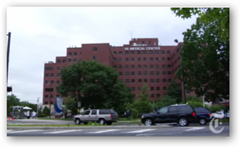92 of 116 cancer treatments over a span of more than six years had issued and problems, isotope seedings mostly in the wrong locations and defective or substandard seeds causing patient problems and repeating of surgical procedures. So far there has been no reportings of the substandard seeds causing problems, but the improper placement is another issue with elevated doses to the rectum and bladder areas.
The procedure is called brachytherapy and is also used for treatment of breast cancer.  In June of 2008, the unit was shut down. All but a few of the procedures were done by one surgeon. In a related story the VA is almost up to 1 million claims needing to be processed from CBS news.
In June of 2008, the unit was shut down. All but a few of the procedures were done by one surgeon. In a related story the VA is almost up to 1 million claims needing to be processed from CBS news.
Along with the rest of us, it sounds like the VA needs funds as well as other additional safely and peer review activity. Between this story and the colonoscopy posts with HIV and hepatitis, it shows how important procedures and safety standards are, not only at the VA, but everywhere. BD
For patients with prostate cancer, it is a common surgical procedure: a doctor implants dozens of radioactive seeds to attack the disease. But when Dr. Gary D. Kao treated one patient at the veterans’ hospital in Philadelphia, his aim was more than a little off.
Most of the seeds, 40 in all, landed in the patient’s healthy bladder, not the prostate.
It was a serious mistake, and under federal rules, regulators investigated. But Dr. Kao, with their consent, made his mistake all but disappear.
It was a serious mistake, and under federal rules, regulators investigated. But Dr. Kao, with their consent, made his mistake all but
disappear. Although Dr. Kao was board certified in radiation oncology, he had limited experience in brachytherapy, according to the nuclear commission. Even so, the unit had no peer review.
He simply rewrote his surgical plan to match the number of seeds in the prostate, investigators said.
The revision may have made Dr. Kao look better, but it did nothing for the patient, who had to undergo a second implant. It failed, too, resulting in an unintended dose to the rectum. Regulators knew nothing of this second mistake because no one reported it.
Two years later, in 2005, Dr. Kao rewrote another surgical plan after putting half the seeds in the wrong organ. Once again, regulators did not object.
Surgeries at Illinois hospital months off at the VA Hospital in Illinois
At V.A. Hospital, a Rogue Cancer Unit - NYTimes.com
Related Reading:



Can't believe something like this could happen again and again. Typical unprofessional cover up process which takes place too frequently
ReplyDeleteI recently had a radical prostatectomy and the hospital staff lost my lymph nodes before they could be examined. They were very sorry. Almost as sorry as the previous time they misdiagnosed an MRI of my small intertines. They removed my appendix and later found out it was a case of meckles diverticulum and had to operate a 2nd time 18 hours later. Should I contact my lawyer or what?
ReplyDelete